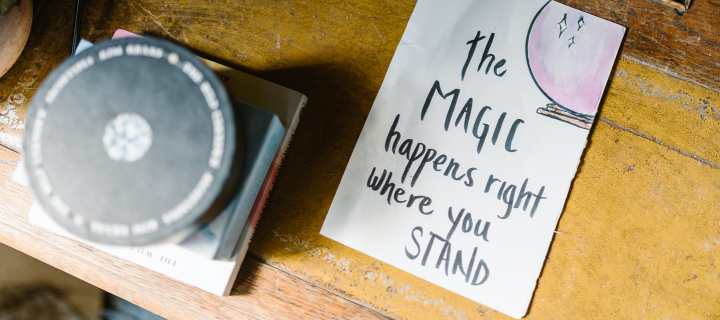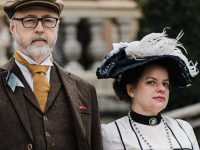You can have exceptional games without having to be or do anything exceptional. Does this sound strange to you? We are convinced that it shouldn’t. Basing ourselves on a shared larp experience, which we managed to make exceptional for ourselves, we want to show that you can create larp magic without making yourself or your story big or unique, and that everyone can find the magic in the mundane.
Enjoy the small moments
We think that one of the first big steps you, as a player, should take, is moving away from the idea of playing a larp as a series of scenes. Every moment is a scene, and the sum makes up the whole of the story. So instead of rushing to preplanned scenes, savour the spontaneous moments that occur. Enjoy the state of being your character, instead of simply attending a scene. As players we both strive to make our characters and their stories richer by enjoying the small, unplanned moments. In turn these moments become powerful and memorable scenes, even if they hadn’t been planned beforehand. As an example we will make a point of sharing stolen moments of quiet with our characters’ love interests that become all the more meaningful because they are small and intimate, and the emotions and impact these moments leave on our characters mean more to them than big speeches or grand gestures ever would. If you are ready to flow with your character and with the small moments that are offered to them, then the small moment of being escorted to a big event by someone dear to your character can become more impactful than the big event itself.
Additionally, it adds a lot of anxiety to your experience if you’re too focused on the big scenes. You will find yourself checking the time and stressing about not missing anything, while also probably worrying about whether you will be able to deliver the scene. In this mindset you will forget to enjoy the small moments, and you may even forget to just be your character. When you plan stories you can obviously also have scenes in them, and you can even plan for these scenes. But always remember that these scenes are not the aim – the aim is what the scenes could make you feel. If they stress you too much to embody your character, drop them, they do not have to happen.
Sometimes a larp’s arc requires planned scenes, but the time in between important plot points is not time wasted. We believe this time “in between” is in fact fundamental to building a meaningful story and character arc. Life is lived in the gaps as much as it is lived in the big moments, and we want to devote as much care and consideration to these gaps as we do to the big scenes. It might not be as flashy, but it can be just as important. People, and indeed characters, exist when things are quiet as well, so giving yourself the time to feel them out in the calm between the storms can make the entire experience seem that much more meaningful.
Give up on being big or unique
Sometimes the most interesting characters are the entirely mundane ones. Your characters don’t have to be larger than life at every turn to have an interesting and unique story, rather the contrary, in fact. If every character in the larp happens to be “the chosen one”, there can be much more play in being the most mundane character around.
We have often seen people concerned about creating a character concept that hasn’t been seen before, and we have certainly fallen into that pattern ourselves, but with such an approach you risk forgetting the most important aspect of character creation; playability. If your character is meaningful to you, does it really matter if it has been seen a thousand times before? There’s a reason the same stories and archetypes keep returning – maybe their stories are actually interesting enough to be retold. You, the player, are the one who makes the story unique, worthwhile, and entirely your own, by adding your flavour and interpretation to it. So instead of going out of your way trying to come up with a brand new concept, own your story and play it in your own unique way. In a way it can be liberating to let go of the pressure to create something never before seen, it can allow you to shift your focus to what you really want to play and actively draw on inspiration from others. When developing your character, look towards similar concepts you have seen others play and spend some time reflecting on what it was that drew you towards them, which aspects of them you liked. And then take them for yourself! Why not make use of all the cool things you have seen friends and co-players do in the past, taking all the best bits to create the coolest possible character for yourself? The old adage that great artists steal should apply to larpers as well. When looking towards others we are sure that, apart from inspiration, you will find parts you weren’t as keen on or wish would have been done differently. You have a chance to do it better, or at least how you would prefer it, and that in itself automatically makes for a unique character.
Next to letting go of the idea of creating unique and big characters, we equally want to argue for the importance of small moments and impactful gestures. When we played together at College of Wizardry 23 (2020) we created a lot of meaning in the relationships between our characters with very little. There were a lot of jabs and meaningful glances between our characters, and our entire conflict of betrayal and resentment was something our characters never explicitly talked about during the first half of the larp, but their small, bitter remarks towards and about each other, the looks of hate and anger between the two of them, and the unspoken defiance and blame were something we played on a lot. In turn, when our characters later reconciled the subtle changes in how they looked at each other and addressed each other made a big impact. In many ways they were acting the same, arguing about the same things they always had, but now they smiled instead of glaring, they helped each other instead of gloating. We don’t believe it was a difference that a lot of our co-players noticed, but that was never the goal; it was important for us. We believe these smaller gestures are too easily forgotten or downplayed, but they deserve our attention. A small gesture can make a big difference if it ties into your story and adds to the whole.
Lastly, taking small gestures and intimate play one step further, we want to highlight the powerful impact of conflicts and emotions left unsaid and paths not taken. As is also clear from our previous example, play can come not only from small gestures and subtle changes in behaviour, but also from the things that are not explicitly spelled out. You can shape a large part of your experience by internalising your character’s emotions and playing on not talking about them while still showing them – clearly or subtly. There is a lot of play on unspoken emotions, on not saying things that are clearly there, as this creates a tension other players can choose to interact with in the way their character would read (or misread) them.
An example of this type of play on unresolved tension and unspoken emotions is the experience we had together at Dawnstone (2019). We had agreed beforehand on a potential for romance between our characters, and while during the larp this romance never came to fruition, its potential and the resulting interactions had a big impact on the stories of both our characters. During the events of the larp, it became clear that our characters cared for each other – they had brief but meaningful conversations; when one screamed out in agony, the other was immediately by her side to help her; they would find each other for small shared moments. They never confessed their feelings for each other but kept floating towards each other for various reasons. In the end, it only took one sentence while looking into each other’s eyes to establish again what they could’ve meant for each other, and while that very small and short moment was only shared between two players, it was nevertheless incredibly meaningful to both of our characters.
Making your story matter — to you, not to an audience
At the end of the day, the most important person in your story is yourself. It shouldn’t matter if everyone sees a crucial moment or if no one does – if the moment held meaning to you, it was significant.
It’s easy to fall into the trap of thinking that bigger is always better. The more people see what is happening, the more play it creates, right? In our experience that is not always true, and some scenes may indeed give you more if no one is around. We suggest trying to consider what intimacy could add to a scene that you would lose out on if there was an audience. Perhaps you would like to really focus on one or just a few other players, and with more players around you would be too concerned with engaging them instead of playing off those important to the scene. Or maybe you want to go big and dramatic without worrying about stealing the spotlight. It is our experience that a smaller scene often has more room for all players to go big, as when fewer people have to share the spotlight there can be so much more of it to go around. Intimacy is something special and valuable. It can add a sense of importance to a scene that you made time for each other, and only each other, and that alone often makes a connection feel deeper and closer. Having a big impact on few people can do just as much for a larp as having a smaller impact on many people.
One example, and a memory we both cherish, of how moments in a larp can be impactful without being big or having an audience, is a scene we shared at College of Wizardry 23. We had created a story arc together around family, betrayal, and resentment that involved chronomancy, which led to us playing out one pivotal moment in our characters’ past/present between just the two of us. We were our own audience, and played for our own character development, and as such we ended up creating a very intense moment and story together. As we were the only ones who actually lived through all of it, this added aspect of intimacy or privacy made it even more powerful.
Conclusion
In this article we wanted to argue that you can create some of your most memorable, or magical, moments in larp without having big scenes, doing unique things, or being that one special character.
We shared our own experiences with creating compelling stories without having to impose anything on others and while staying small. When you shift your focus to being your character instead of doing things as your character, to living the story as well as the emotions and creating small moments and gestures, you can build a deep and impactful experience. It’s liberating and enhances your play to stop worrying about moving from big scene to big scene, or about the uniqueness of it. There’s no need to bring something new to a game each time, and it can create better play and a better experience to play on something that has been done before. Just remember to do so in a way that works for you, as you are in the end the most important person to your experience.
Often it isn’t necessarily the big scenes that we carry closest to our hearts after having played a larp, it’s rather the unexpected small moments, the unplanned occurrences, the intimacy. It’s in these mundane moments that the magic happens in a larp, and we hope we have inspired you to go out and look for it.
Cover photo: Image by RODNAE Productions on Pexels. Photo has been cropped.
This article is published in the companion book Book of Magic: Vibrant Fragments of Larp Practices and is published here with permission. Please cite this text as:
Bailly, Sandy, and Mia Kyhn. “Finding the Magic in the Mundane.” In Book of Magic: Vibrant Fragments of Larp Practices, edited by Kari Kvittingen Djukastein, Marcus Irgens, Nadja Lipsyc, and Lars Kristian Løveng Sunde. Oslo, Norway: Knutepunkt, 2021.






